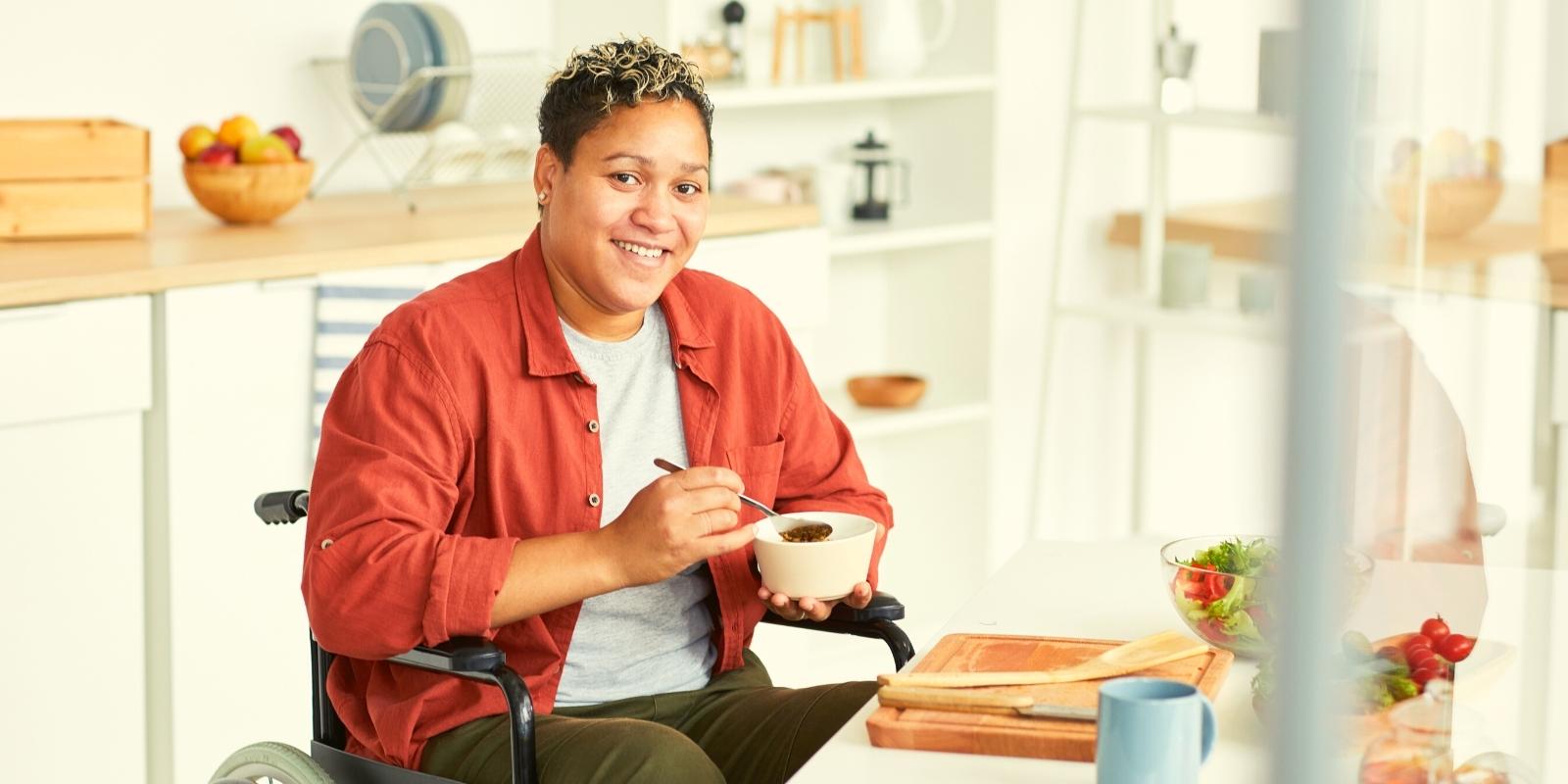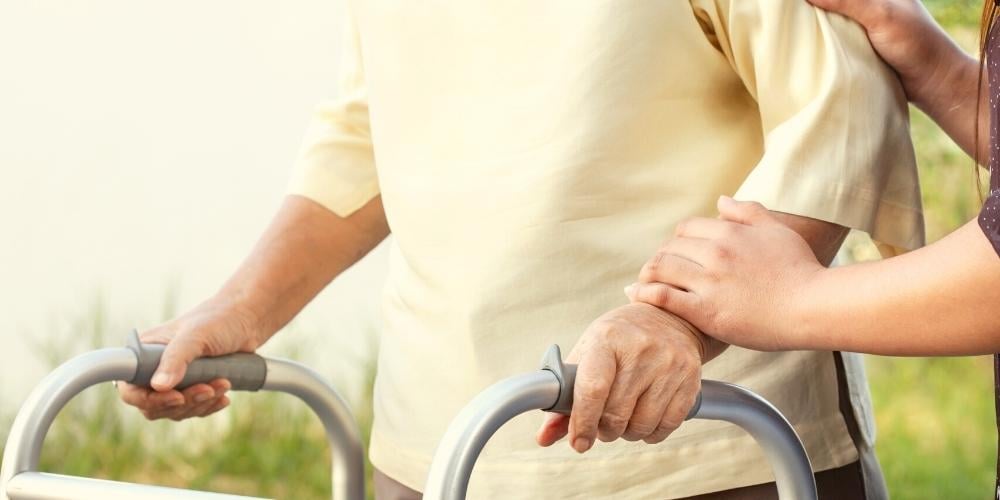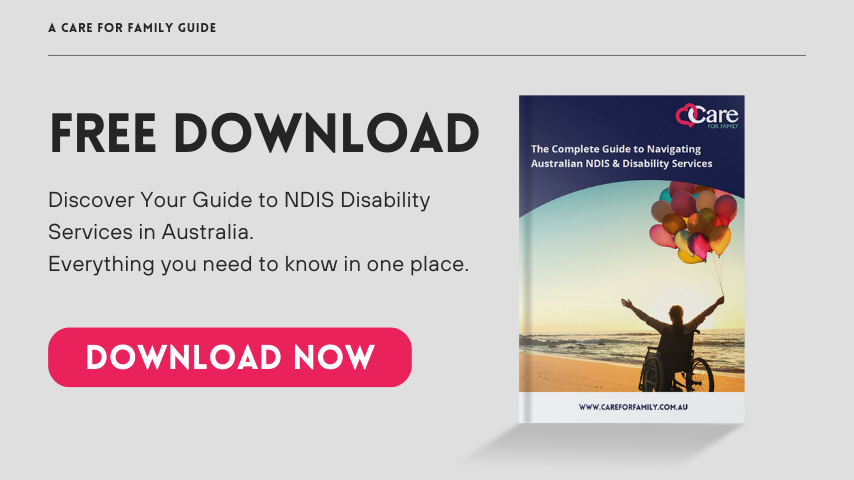Living Well at Home with a Disability

November 7, 2022
Some of the most common complaints among people living with a disability are that they wish they’d known more about what to expect and that they’d had more information. There’s no doubt, with around 4.4 million Australians living with a disability, we could be doing better when it comes to supporting and informing them. In this guide, we aim to give you more information about living with a disability – from what you can do to limit its impact on your life, to the kinds of services you can access, and how.
Explore our comprehensive NDIS & Disability Services Guide for in-depth insights and support options tailored to your needs.
Living with a disability – being prepared
Coming to terms with a disability is never an easy thing, but it can be made much more so by being prepared and knowing what to expect. We all tend to take our health and that of our loved ones for granted until it’s taken away. If you or your loved one has experienced a disabling injury or illness, knowledge is your greatest asset. Learning what to expect, including what symptoms may occur and how the illness or injury might cause a disability to develop over time, gives you the power to make decisions about your life, your care, and how you’ll manage your disability. This knowledge and these decisions are not only empowering for anyone living with a disability but can also help carers and loved ones.
Although no one expects or welcomes the diagnosis of a disability, it doesn’t have to define you or the way you choose to live. When coming to terms with a disability, there are a few things that can help:
- Don’t wish it away: Denial is an important stage in the grieving process, and receiving the diagnosis of a disabling illness or injury means giving yourself time to grieve (this includes receiving a diagnosis about a child or a loved one). There may be a certain period of denial or wishing away the disability, but it doesn’t have to continue to stand in the way of acceptance. Instead, look ahead to the things you can do, not the things you can’t.
- Learn as much as possible: Not knowing what to expect is a scary thing, and is why learning of a disability can sometimes be a shock and upsetting. But many people find that with greater knowledge about their disability and what to expect, the initial shock is replaced by a determination to take greater control over their lives. You may find that although you were expecting the worst, the reality is actually very different.
- Turn to sources of hope: These days, there is much more information available about disabilities in Australia and, thankfully, there are many wonderful advocates driving change around how we speak about disabilities and better support those that live with them. Getting in touch with local support groups and reading the stories of other Australians living with a disability can give you more information about what to expect and help you better understand positive and practical ways to live well with your disability.
- Get the support you need: One of the most frightening things for Australians living with a disability is coming to terms with the possibility of losing their independence. But this needn’t be the case. With the advent of the National Disability Insurance Scheme (NDIS) Australians living with a disability are better supported than ever. The NDIS provides funding directly to those with a disability and allows them to choose care services, home modifications, and more, to support them to live life as independently as possible.
- Make a plan: Planning ahead means making decisions about your life, lifestyle, care, and more before it’s too late. Failing to make these plans not only takes control out of your hands but can put an incredible burden on your family and loved ones. If your disability is something that may progress or worsen over time, making decisions about things early can reduce this burden and ensure you’re the one in control. We cover more about this in the next section.
- Monitoring: For many people, their disability and the symptoms it causes will change over time. It is important to know your own body, be familiar with your symptoms, and monitor your body for changes. These changes are your cue to speak with loved ones and your doctor, and adapt your care, medication, and plans, accordingly.

Making a plan for living with a disability
No matter the type of disability you are living with, making a plan is an important thing to do. It helps you ensure your wishes are carried out, your quality of life (however that looks to you) is maintained, and more. Questions you should ask yourself include:
- What does the new normal look like?
- How important is maintaining independence?
- What does quality of life look like to me and how can I achieve it?
- Is the preference to continue living at home, with loved ones, or in a care facility?
- How much support do I want and need, now and in the future?
- Will the disability develop or worsen in the future and what can I expect?
- What health conditions are related to the disability?
- What services are available to me?
- Who can support me to live the life I want?
- Are there advocates available to help me access support and services?
- If there comes a time when I’m unable to make decisions for myself, who can make them for me?
Any disability, be it a physical or intellectual disability, or the result of ageing, will impact your life in a big way. But although you’re facing limitations that make certain aspects of your life more challenging, armed with knowledge, a plan, and a willingness to do things a little differently, you can reduce the impact a disability has on your life.
Creating a care plan: Your care team will create a care plan, in consultation with you, your loved ones, and any funding or support programs you are involved with. Whether it’s an aged care plan for Australians over the age of 65, or a plan for delivering services under NDIS funding, we can assist you in being prepared for living well with your disability.

How to live independently with a disability
There are many different types of disabilities, and the symptoms they cause look different for everyone. That’s why it can be hard to know where to turn or what to expect, especially when wondering how to live independently with a disability.
Knowing what kind of care is available can also be a little confusing. That’s why it’s important to consider getting support from an expert care service. Care services, available at home or in dedicated care facilities, are can be available for people experiencing:
- Vision impairment
- Deafness or trouble hearing
- Mental health conditions
- Intellectual disability
- Aged-related illnesses
- Dementia
- Physical disability
- Acquired brain injury
- Autism spectrum disorder
- Mobility impairment, and more
Many Australians living with a disability choose to stay at home, living as independently as they can, for as long as possible. Depending on your disability, you too can choose to remain living at home, with a bit of extra support.
In-home care services like those from Care For Family are designed to make it easier for those living with a disability to live safely, happily, and independently. Helping you to maintain your independence and quality of life is our mission, and our dedicated, expert care team assists you in doing just that. The types of services we offer to help you live safely at home, include:
- Domestic support: From unpacking the groceries to cleaning the house, to changing the bedsheets, our domestic support services help you with a variety of in-home tasks. These services mean you can continue to live at home, and don’t have to contend with things that can cause you added stress and strain.
- Personal care: For many people living with a disability, taking care of themselves can become a challenge. We understand that this can be an incredibly personal thing, and our committed care team is compassionate and professional in delivering the personal care services that will ensure you or your loved one can continue to live at home. From showering and bathing to personal grooming, toileting, and more, our team will assist with kindness, patience, and the utmost discretion.
- Aged care: Care For Family are experts in aged care services, and understand the types of challenges facing Australians aged 65 and over. From reduced mobility to trouble driving, to living with dementia, our aged care team can ensure you’re still able to live independently, with our support.
- 24-hour care: For those who require round-the-clock care, an aged care or disability care home might seem like the only solution. Nothing could be further from the truth. With our 24-hour home care services, we can ensure that you have someone in the home to support you, 24 hours a day, 7 days a week.
Find out more about our disability care services here.
Reducing the impact of your disability
Whilst care services are a valuable resource for anyone living with a disability, many people also find it important to do what they can to reduce the impact of their disability. Although your disability can mean certain limitations to what you’re able to do, there are plenty of things you can do to support your own health and well-being.

Physical activity
Physical activity has important health benefits for everyone, and for those living with a disability, it can be beneficial in reducing the impact of the disability. In consultation with your doctor and specialists, you can participate in physical activity to:
- Improve muscle, heart, and lung function
- Prevent or slow the degradation of the muscles
- Improve balance
- Assist in weight loss or weight gain, as appropriate
- Enhance the body’s ability to fight infection
- Boost mental health and mood
- Improve memory and cognitive function
Although a disability can sometimes mean limitations when it comes to physical activity, keeping active simply means adjusting to a new normal and focusing on the things you can do. Be sure to speak with your doctor and/or an experienced physical therapist about the kinds of activities that are best (and most enjoyable) for you.
Conserving your energy
Living with a disability can mean facing the challenges many older Australians face, a few decades early. From getting tired more quickly than you used to, to having to battle constant fatigue, reduced mobility, or a loss of the strength you once had, it is a learning curve. But learning to conserve your energy, or ‘pick your battles’ can be the key to living well with a disability. Instead of giving yourself a hard time for having overdone it, learn to listen to your body and take breaks as and when you need them. Getting this right can help to reduce fatigue, pain, and frustration and help you better manage your disability so that it has less of an impact on your daily life.
Managing pain
Many types of disability cause pain, whether it be chronic ongoing pain caused directly by your disability, or secondary pain that results from overdoing it, having a slip or a fall, or injuring yourself. Managing pain is a tricky balancing act that should be discussed with your doctor. Your main priorities should be to reduce your pain (and prevent it where possible), whilst limiting any unpleasant side effects that pain medication can cause. Know that this too is a learning curve, and takes some time to get right. Don’t ever feel embarrassed to bring it up with your doctor and loved ones – they’re there to help and support you on this journey.

Supporting devices and equipment
Your not-so-secret weapon in reducing the impact of your disability is making use of supporting devices and equipment. As we learn more about disabilities and how we can support those living with them, the types of devices and equipment available are evolving. From a wheelchair, to rails for getting around the home, to eating aids, and more, your therapist can help you to know what equipment is available for you and what will best suit your needs.
Doing what you love: You might find some of the activities you once loved are not possible any longer, due to the disability. For some, it means no longer being able to do a job they loved. Rather than focusing on what you can’t do, now is the time to find new interests and passions. For you, that might mean getting in touch with disability support groups where you can connect with others who know what you’re going through. Or it might mean getting involved with events, activities, or communities that have nothing to do with your disability.
Some of the things you might consider include:
- Volunteering
- Helping out those less fortunate
- Taking care of an animal (volunteering, fostering, or adopting)
- Taking up a new hobby that suits your abilities and interests
- Playing a new sport that’s suited to your abilities
- Learning a new language
- Doing puzzles and crosswords that keep your brain active
- Meeting up with support groups or with likeminded people
- Participating in community activities (yes, even those that have nothing to do with your disability)
No matter what you choose, do something that gives you purpose and reinforces that you and your loved one are not defined by a disability.
Reach out for more information
Here at Care For Family, we are experts in providing care for Australians living with a disability. Our team is compassionate, highly trained, and experienced in delivering care solutions that help you maintain your independence while living safely and happily in the place you choose. For more information about our care services, or for additional resources to help you in living with your disability, get in touch with our team today.

